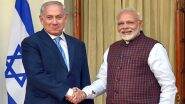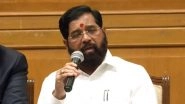Tegucigalpa, Feb 19 (AP) Honduran President Xiomara Castro on Tuesday reversed course on a decision to end a long-running extradition treaty with America after reaching an agreement with US President Donald Trump's administration.
The reversal came as the Trump administration has struck agreements with a number of Central American nations to receive deported migrants from other nations, often after pressure was applied or offers of support made on other issues.
Also Read | PM Narendra Modi Meets Former UK PM Rishi Sunak, Calls Him a 'Great Friend of India' (See Pics).
"I announce that I have reached an agreement with the new American administration so that the extradition treaty will continue with the necessary safeguards for the state of Honduras," Castro wrote in a post on X.
Honduras was not a stop on US Secretary of State Marco Rubio's recent Central American tour and while Honduras has continued to receive its own deportees, neither Honduras nor the US have said there is a deal for Honduras to also receive migrants from other nations.
In February, Mexico started sending 10,000 troops to the US-Mexico border to postpone threatened 25 per cent tariffs. Last month, Colombia's firebrand leftist leader caved in a showdown after Trump threatened steep tariffs and sanctions after the Colombian government said it wouldn't take deportation flights in US military aircraft.
On Tuesday, Honduran Foreign Minister Eduardo Enrique Reina said the extradition treaty was part of direct talks with the White House, in which the governments discussed five key issues -- migration, military agreements, free trade agreements, investment in trade infrastructure in Honduras and extradition.
It wasn't immediately clear what, if anything, Honduras would get from the agreement.
Reina added that the extradition treaty would include "important, normal safeguards", namely that cases of extradition would not be politicised in any way and based on legal factors.
It's a change of tone from Castro's administration. In August, Castro said that she would end the treaty after the US ambassador in Honduras questioned a visit of Honduran military officials to Venezuela to meet with officials accused by the State Department of drug trafficking.
The comments by the diplomat stroked anger in the Honduran government, which decided to end the treaty. The treaty has seen high-profile crime suspects including Castro's predecessor former president Juan Orlando Hernandez extradited to the US. He's serving a 45-year prison sentence in the US for drug trafficking.
Days after Castro announced she was cancelling the treaty, her brother-in-law Carlos Zelaya, brother of former president Manuel Zelaya, appeared in a video in which he is seen with several well-known drug traffickers negotiating a bribe. The video fuelled anger in many Hondurans, who said that her real reason to end the treaty was to protect her family.
Reina said on Tuesday the latest decision was important to ensure the democratic integrity of the country's upcoming elections, a process in which the Honduran military is a guarantor.
"We are not here to favour politicians or criminals, but, if in any way, the extradition treaty is used to destabilise the government or elections through an attack on the armed forces, that does concern us," he said. (AP)
(The above story is verified and authored by Press Trust of India (PTI) staff. PTI, India’s premier news agency, employs more than 400 journalists and 500 stringers to cover almost every district and small town in India.. The views appearing in the above post do not reflect the opinions of LatestLY)













 Quickly
Quickly


